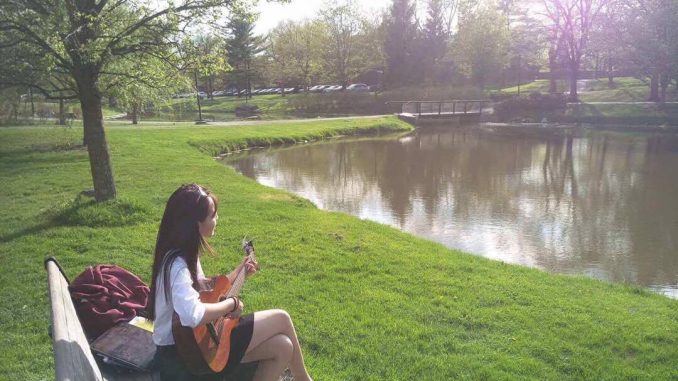
Elena Cao was shocked when an elderly woman stood up and started dancing during her music therapy performance at Woodland Pond retirement home in New Paltz. This was not the response she expected.
As an exchange student from the Central Conservatory of Music in Beijing, Cao, 22, was used to the quieter, more reserved musical atmosphere from her home. She was about to experience new ways to connect through music.
Cao arrived at SUNY New Paltz in Fall 2016 feeling unconfident in her English fluency or American music styles. After a one-year exchange program through the Conservatory, she was singing songs in English with ease as she reached her audience on a deeper level than ever before.
“She had confidence in her musicality playing American standards from the Great American Songbook and really engaged the older adults [at Woodland Pond],” said assistant music therapy professor Dr. Michael Viega. “She has a natural ability to be an open group leader. It was really great to see that come out.”
A recent New Paltz Magazine article explained that Cao’s experience is not an uncommon one. China’s Central Conservatory of Music often sends undergraduate music therapy students to the College for this one-year exchange. In fact, two of Cao’s professors in Beijing, Sisi Lin ‘12g and Lo-Ting Chen ‘00g, earned master’s degrees in music therapy at SUNY New Paltz before landing jobs at the Conservatory.
Viega said that the College’s music therapy program offers diversity that some other programs do not. They teach all different approaches to music therapy, not just one. It is a graduate-only program, but undergraduate students can take prerequisite and elective courses up to nine credits that will matriculate and lead them to an audition for the graduate program.
Born in Kaifeng, China, Cao always had a strong penchant for music. She has played piano since age 3 and has since learned guitar and vocals, the essentials for becoming a music therapist.
“When I was young I wanted to be a doctor but I really like playing piano, singing and dancing, so after high school I chose this,” she said. “This academic field is most meaningful for me because I can use my power and energy to help other people, not just play the instrument and do something else with it.”
Music therapy is recognized as a form of psychotherapy by New York State, which means a licensure is required to practice it professionally. Cao spoke of her yearning to help people through music and the effectiveness that music therapy truly has.
“Some clients have dementia, so they lost their cognitive abilities,” she said. “When adults have lost this connection, they can sing old songs that they think they forgot. But after we sing they remember. When we play and sing the songs together, the positivity, emotion and memory can be awakened.”
Cao strengthened her English through English as a Second Language (ESL) classes during her time at New Paltz. But she gained so much more in terms of new culture. According to Cao, the practice of music therapy varies greatly between her home country and New Paltz.
“I’ve always played classical music but now I just want to play more jazz,” she said. “It’s a challenge for me but it’s so interesting.
“My professor pushed me into so many types of practices. Before I only used my fingers when I played. [Now] I use my arms and my whole body.”
An assignment in Viega’s “Music to an Older Adult” course and another inspiring experience at Woodland Pond fortified Cao’s ability to connect with others.
Viega assigns his students a project to interview an older adult whom the student is close with. They are to learn about the person’s life from their earliest childhood memories to now. They also learn about their favorite songs, culminating in a 10-minute video that interweaves their narrative with their life’s soundtrack, a musical “legacy” project.
“I interviewed my grandma after that, and I view her differently than before,” she said. “Before I didn’t know my grandma well and I didn’t realize the older you are, the more lonely you are and the more you need to be heard and accepted.”
Later in the semester, on Cao’s last day visiting Woodland Pond, there was an older woman who was hesitant to speak with Cao. However, after Cao’s performance, the woman said to her, “This may be the last time I see you. I wish all the luck to you.”
“After [the experience with my grandma], I tried so hard to connect with this woman,” she said. “[It all] happened like magic. I think I can listen to people more now. I am so appreciative to have a chance to be closer than before with my family. We are close but not really close–there are so many things we didn’t know.”
Cao will take her new skills back to Beijing this year for an internship working with special education children. Upon completion, she will graduate the Conservatory. Afterwards, she strongly considers returning to SUNY New Paltz as a graduate student.
“When I was at New Paltz, I felt so much different [when I performed],” she said. “I hope I can get ready and go to New Paltz for a master’s degree.”
